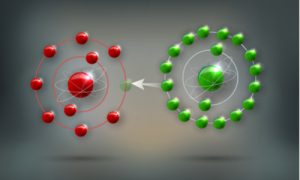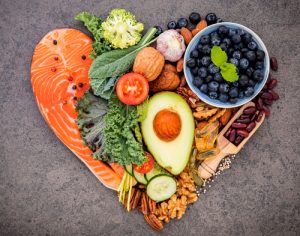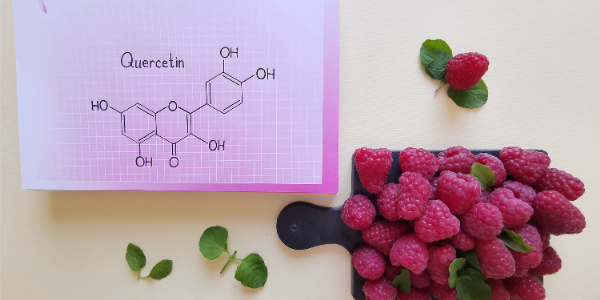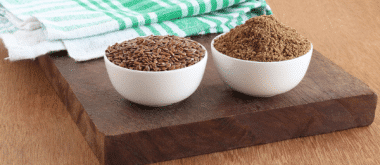As we age, wisely we become more concerned about staying up-to-date on developments regarding our well-being in order to stay healthy and avoid unnecessary health risks.
From resveratrol and nutrition studies, to learning the impact of sleep and exercise, a number of factors can play a role in our health as we age.
Among the nutrition research taking place in terms of aging health and overall wellness, scientists are ramping up studies on a plant-based flavonoid known as quercetin, to fully understand its benefits and potential risks.
Found in many plants and foods, such as red wine, green tea, berries, Ginkgo biloba and others, quercetin is known as an important active substance of “red wine medicine.” Its impact comes into play when observing the effects of free radical damage and cell health by promoting healthy cell growth and acting as a free radical scavenger in the body.
Powerful Antioxidant Properties
The term “antioxidant” refers to any compound that can counteract unstable molecules, known as free radicals, that damage the body’s DNA, cell membranes, and other parts of cells.
Havard Medial School’s Havard Health Publishing clarifies antioxidants’ impact by explaining “because free radicals lack a full complement of electrons, they steal electrons from other molecules and damage those molecules in the process. Antioxidants neutralize free radicals by giving up some of their own electrons. In making this sacrifice, they act as a natural “off” switch for the free radicals.”

In addition to aging, many factors can contribute to an increase in free radicals, including pollution, cigarette smoke, injury, chemical toxins, infection, poor nutrition, and stress.
While flavonoids in general are natural antioxidants, quercetin is considered to be a strong antioxidant due to its ability to scavenge free radicals and bind transition metal ions (e.g., iron and copper), which aid in electron transfer and lead to further molecular damage.
In fact, Quercetin has been found to have stronger antioxidant properties than Vitamin C, Vitamin E, or beta carotene.
Inflammation Reduction
Inflammation is the body’s natural healing response to injury, stress or infection. However, chronic long-term inflammation can be harmful and is often times associated with contributing to a variety of diseases, such as diabetes, cardiovascular disease, arthritis and even allergies.
Recent studies indicate that quercetin has been shown to inhibit in vitro (within a lab experiment) production of the enzymes cyclooxygenase (COX) and lipoxygenase (LOX), which are typically induced by inflammation. These anti-inflammatory effects of quercetin have been supported by multiple experiments and indicate an involvement and association with inflammation reduction and thus a reduction in risk factors for various diseases and health concerns. In fact, due to its antioxidant properties, some research indicates that quercetin may guard against many types of cancer.
Studies in animals have shown that quercetin can reduce cancer cell growth and cause cancer cell death. While additional research and ultimately human studies are needed, these findings are encouraging when it comes to cancer research for treatment and prevention.
Support for Cardiovascular Health

One of the major therapeutic goals of modern cardiology is to determine effective strategies aimed at saving the muscular tissues of the hearth from the negative effects of ischemia-reperfusion injury (IRI), or the damage of these tissues due to major types of cardiovascular disease.
Quercetin has been documented to provide the body with beneficial effects when it comes to cardiovascular disease and IRI. One of these findings includes studies conducted on heart health and blood pressure, which indicate a statistically significant effect of quercetin supplementation in the reduction of blood pressure. Other research indicates that quercetin can prevent damage to LDL cholesterol, and help lower cholesterol levels.
Getting Quercetin in Our Diet
Quercetin, like other flavonoids, is abundant in the foods we eat. Dietary levels of quercetin can range from 5 mg to 500 mg, depending on diet choices. Some of the foods that have been found to have the highest concentrations of quercetin include red grapes, red and yellow onions, apples, raspberries, green and yellow peppers, green leafy lettuce and spinach, buckwheat, and broccoli to name a few.
Beyond everyday levels of dietary quercetin, when needed, choosing an anti-aging supplement that contains quercetin is another way to reach a therapeutic or evidence-based level of the flavonoid.
Ultimately, eating a wide variety of fruits and vegetables each day is the best way to ensure adequate levels of dietary quercetin intake and optimal nutritional health.





